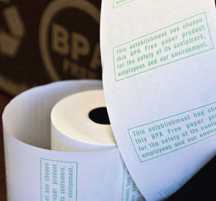Bisphenol-A, also known as BPA, is an industrial chemical component of many widely-used items including plastics, resins, canned food linings, and paper goods. Studies have suggested that long-term or high-dose exposure to the organic,  estrogen-like compound disrupts the body’s endocrine system and may be linked to cancer, heart disease, intestinal damage, reproductive problems, erectile dysfunction, diabetes, obesity, impaired neurodevelopment, and behavioral changes in children.
estrogen-like compound disrupts the body’s endocrine system and may be linked to cancer, heart disease, intestinal damage, reproductive problems, erectile dysfunction, diabetes, obesity, impaired neurodevelopment, and behavioral changes in children.
BPA is a part of a thermal paper coating that acts as a color developer in small credit card and cash register receipt printers. According to a CBS news report, some receipts contain up to1,000 times the levels found in a can of food. Needless to say, cashiers get a lot of exposure to the simple organic molecule.
After discovering that people who regularly handle cash register and credit card receipts have elevated levels of BPA in their urine – and presumably their bloodstreams, researchers at the Joint Research Unit for Xenobiotics at INRA-Toulouse have shown that BPA does not have to be ingested to enter the body: It can be absorbed through the skin.
Daniel Zalko headed up the study that applied differing amounts of BPA to freshly slaughtered pig’s ears then studied the cultures. Within three days, the chemical had migrated through the skin and would have entered the bloodstream of a living being. Similar tests conducted on healthly human abdominal skin donated through surgeries, replicated the results.
Those concerned about casual exposure to BPA can check their receipts:
• Wisconsin-based Appleton paper dropped BPA from its paper in 2006 and started using BPS (bisphenol sulfonate) in its place. The company makes about half the receipt paper used in the U.S. and now embeds it’s BPA-free thermal receipt paper with red rayon fibers. The red rayon, a recyclable cellulose fiber, indicates that the receipt paper is BPA free.
• An online vendor has enlisted an unnamed supplier to help it offer BPA free thermal FSC-certified receipt paper made with 40% post industrial recycled fiber. It is printed on the reverse with “This establishment has chosen this BPA Free paper product for the safety of its customers, employees, and our environment.” There is no mention of what chemical replaces BPA in this product.
In response to concerns over BPA-laden receipts, many local businesses and institutions are discontinuing their use. The Multnomah County Library switched to the Appleton paper in December 2010 and will see a savings of about 14% because the paper is not only BPA free, it’s less expensive.
For More Information on BHA in register receipts:
Viable skin efficiently absorbs and metabolizes bisphenol
A, Chemosphere, Volume 82, Issue 3, January 2011, Pages
424-430. doi10.1016/j.chemosphere.2010.09.058
http://www.ncbi.nlm.nih.gov/pubmed/21030062
Transfer of bisphenol A from thermal printer paper to the
skin Anal Bioanal Chem (2010) 398:571–576 DOI 10.1007/
s00216-010-3936-9 http://www.ncbi.nlm.nih.gov/pubmed/20623271
Nation’s Largest Maker of Thermal Receipt Paper Does
Not Use BPA
http://www.prnewswire.com/news-releases/nations-largest-maker-of-thermal-receipt-paper-does-not-use-bpa-111620639.html





